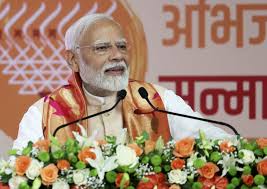CHANDIGARH: It seems the BJP had finalised its election strategy and seat-sharing arrangements for Jharkhand even before Haryana and J&K elections, as indicated by Prime Minister Narendra Modi’s recent warning about “infiltration by Bangladeshis and Rohingyas in tribal areas” of that state.
A buoyant BJP leadership believes that “anger” against the party after nearly 10 years of rule in the Jat-dominated Haryana was vented out in the Lok Sabha elections, and that the tribals-dominated Jharkhand which hosts 8.3 per cent of the country’s Scheduled Tribes (ST) population would see a similar situation.
Besides, with three prominent tribal faces Arjun Munda, Babulal Marandi and Champai Soren in its ranks, it believes it has sufficient ammunition to take on Chief Minister Hemant Soren, who heads the multi-party JMM-Congress-RJD ‘mahagathbandhan’ government.
The BJP had lost five of the state’s 14 Lok Sabha seats to the INDIA alliance in this year’s parliamentary elections interestingly, it had lost five seats in Haryana, too, out of the total 10.
The NDA allies in the state include JD-U, AJSU and the Chirag Paswan-led LJP. While the BJP is expected to negotiate hard with them and land a large share of the seats to contest for the 81-member Assembly, AJSU is likely to contest nine, JD-U two and LJP one seat.
The Congress’ INDIA allies, meanwhile, are expected to drive a hard bargain after the grand old party’s disappointing show in the Haryana and J&K Assembly elections.
Speaking in Jharkhand a few days ago, the Prime Minister termed “infiltration” by “Bangladeshis and Rohingyas” a “major threat to the state as it was “rapidly changing” the identity and demography of the Santhal Pargana and Kolhan regions.
He also accused the JMM-led coalition government of “encouraging infiltration for political interests” and doing “appeasement politics to create a new vote bank for remaining in power”.
“The increasing population of infiltrators and the decreasing number of tribal societies are all a result of JMM and Congress hunger for power. The truth is that the JMM people are standing together with the Bangladeshis and Rohingya. These infiltrators and radicals are also taking control of the JMM, their people have infiltrated the party,” he said at the rally, in the presence of Union Minister Shivraj Singh Chouhan and former Chief Minister Champai Soren, who quit the JMM to join the BJP recently.
“In Santhal Pargana, the population of tribals is rapidly changing, land is being grabbed, infiltrators have taken control of panchayats and amenities, and exploitation of women is increasing. Because of this infiltration, people in Jharkhand, in cities as well as villages, are feeling unsafe,” he said.
It may be noted that while hearing a PIL on infiltration, the Jharkhand High Court had ordered the setting up of a committee to look into the issue of the declining population of tribal communities in the Santhal Pargana region. The PM raised similar concerns for the Kolhan region, which is not part of the litigation but is the stronghold of Champai Soren.
Jharkhand has around 33 scheduled tribes, according to the Ministry of Tribal Affairs.
As per the 2011 census, the ST population in Jharkhand was 86,45,042, out of the state’s population of 3,29,88,134; this amounts to 26.42 per cent of the state’s population, and 8.3 per cent of the country’s total ST population.
With 14.7 per cent, Madhya Pradesh has the highest share of the country’s ST population, followed by Maharashtra (10.1 per cent), Odisha (9.2 per cent), Rajasthan (8.8 per cent) and Gujarat (8.5 per cent).
Interestingly, the five seats the BJP lost in the Lok Sabha elections are dominated by STs.
The women voters of Jharkhand are in the happy position of being wooed by both JMM and BJP ahead of the Assembly elections, scheduled to be held in November-December.
CM Hemant Soren is banking on the Maiyan Samman Yojana, which his wife Kalpana who is emerging as the star campaigner of the JMM-led combine is promoting across the country as she focusses on women voters. Under this scheme, women in the 18-50 age bracket are granted Rs 1,000 every month. After the third instalment of the grant was distributed during Navratri, Soren announced that the fourth instalment will be transferred to the beneficiaries’ accounts before Chhath next month.
Meanwhile, the BJP has announced its own Gogo (Santhal word for mother) Didi Yojana.
Union Minister Shivraj Singh Chouhan, who is in charge of the party’s Jharkhand election campaign, recently said that women will be granted Rs 2,100 per month after the party comes to power in the state.
Also, the JMM has submitted a memorandum to the Election Commission, seeking its permission to implement the JMM Samman Yojana, under which women are to be granted Rs 2,500 per month, as per reports.
With the parties focusing on tribals, women and populism, Jharkhand is in for an interesting time over the next couple of months.


